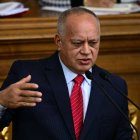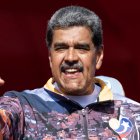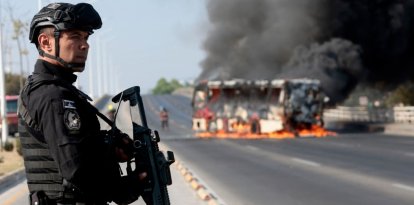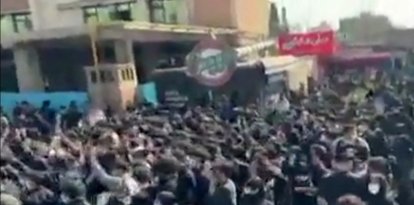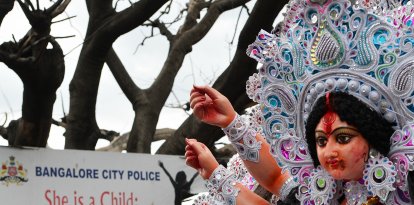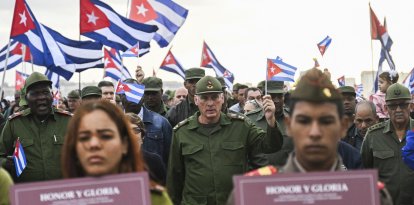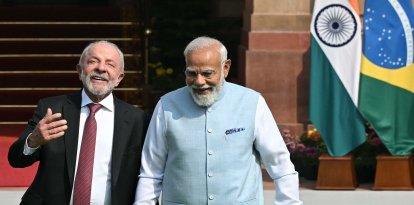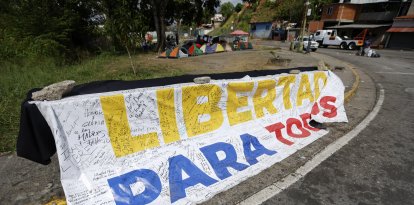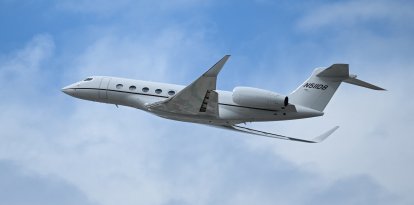From Catatumbo to the Tren de Aragua: the new tools of Venezuelan diplomacy
Due to sanctions, the Maduro regime has abandoned the geopolitics of oil and opts for increasingly violent methods to stay in power.

Nicolás Maduro and Diosdado Cabello at a military celebration.
Ronald Ojeda did not find peace in Chile. His body was found in March 2024 with signs of torture prior to his death. Even Chile was persecuted by the regime of Nicolás Maduro, the Chilean Prosecutor's Office believes.
The investigation's trail points directly to Diosdado Cabello, Chavista Interior Minister and Nicolás Maduro's iron fist with the opposition. This is not just another murder. The Maduro regime's repression is now also being applied outside Venezuela's borders. It is a turning point that marks a change of course and a growing aggressiveness in Venezuelan foreign policy.
Tren de Aragua, assassinations abroad, conflict in Guayana Essequiba... How is Venezuelan foreign action changing in recent years?
Oil no longer sets the diplomatic agenda
Since the beginning of Chavismo, Venezuela has used its oil resources as its main diplomatic tool. The president and architect of the 1999 political change, Hugo Chavez, consolidated alliances with like-minded countries through the Petrocaribe program, which offered crude oil in preferential conditions to its regional environment. With Petrocaribe, he guaranteed Cuba a stable supply of subsidized oil to keep the Cuban regime afloat, an essential ally in the new configuration of Latin America with Chavism.
The economic crisis and international sanctions against the Chavista government put an expiration date on Petrocaribe. Venezuela, which exported more than three million barrels per day in 1998, barely reached 772,000 in 2024. Its leverage collapsed at the same time as crude exports. Without oil to trade, the government of Nicolás Maduro was further cornered.
The regime seeks to project power in other ways. Tension with neighboring countries has increased, just as its relationship with Russia, Iran and China deepens. In 2024, Maduro tried to join the BRICS, but Brazil vetoed his entry due to doubts about the legitimacy of the elections.
What used to be oil diplomacy has become a game of pressures and threats. Chavismo has changed the rules of its foreign policy. Now it plays in a more aggressive terrain.
Persecution of opponents abroad
Ronald Ojeda was until 2017 an active member of the Bolivarian Armed Forces with the rank of lieutenant. That year, the Venezuelan regime accused him of being part of a conspiracy against the government known as the Sword of God. Ojeda was arrested and imprisoned along with several other soldiers until they escaped.
After leaving the country clandestinely, he managed to obtain political asylum in Chile, from where he continued his activism against the government. He had a special presence in social networks, but also organized demonstrations. In 2023 he even traveled to Colombia, bordering Venezuela, to participate in a subversive movement.
For these reasons, his disappearance in 2024 raised the suspicions of the Chilean police. According to Chilean prosecutors, on February 21, 2024, a group of individuals posed as police officers and forcibly entered Ojeda's home. This method is common in Venezuela when criminal organizations in the pay of the government attempt to intimidate the opposition.
Ten days after the kidnapping, Ojeda's lifeless body was found buried under cement in an irregular settlement in Maipú. The autopsy confirmed that he died from mechanical asphyxia and showed signs of torture. The Chilean Prosecutor's Office identified the Tren de Aragua as responsible for the execution of the crime and pointed out that the sophistication of the kidnapping suggested an order from Venezuela.
Prosecutor Hector Barros claimed that behind the murder was the government of Nicolas Maduro. A protected witness directly linked the Venezuelan Minister of the Interior, Diosdado Cabello, as the one who had ordered the crime, in coordination with the leader of the Tren de Aragua, "Niño Guerrero."
Chilean authorities arrested 23 members of the local branch of the Tren de Aragua, plus another arrested in Texas and Illinois, who were also allegedly involved in the crime.
The Tren de Aragua, a tool of the regime
The relationship between the Tren de Aragua and the Venezuelan government is now under scrutiny in an unprecedented way. The criminal organization, designated as an international terrorist group by the Trump Administration, has been instrumentalized inside Venezuela to repress demonstrations and intimidate opponents. Its use outside Venezuelan borders is a symptom of the change in the regime's external action.
Diosdado receives deportees from the Tren de Aragua
Despite the Trump Administration's assurances that several of the deportees were closely related to the Tren de Aragua. At least 17 of the 300 deportees had criminal records.
For its part, the Venezuelan regime issued a statement rejecting versions linking Venezuelan migrants to the Tren de Aragua gang. According to the official statement, such claims are "malicious" and "false", and seek to stigmatize Venezuelans, most of whom, they claim, are "honest and hard-working" citizens.
The criminal organization has extended its influence into the United States in recent years. Reports indicate that the gang has established a presence in at least 19 states, including Florida, California and New York. In Eric Adams' city, the Tren de Aragua is at the center of several arms and drug trafficking operations, in addition to control of prostitution in several neighborhoods.
In response to this expansion, President Donald Trump's administration designated the Tren de Aragua as a foreign terrorist organization in February 2025. This designation seeks to increase pressure on the gang and its collaborators, allowing for the application of more severe sanctions and facilitating the deportation of its members. In addition, deportation flights to Venezuela have resumed, returning illegal migrants and gang members, including members of the Tren de Aragua.
Suspicions about the relationship between the government of Nicolas Maduro and the Tren de Aragua stem from several indications. The gang grew inside Venezuela's Tocorón prison, allegedly without the intervention of the authorities and with the collusion of Chavista officials. After a police operation by the Chavista government to recover the prison, the leader of the organization escaped without problems, which generated doubts about a possible complicity with the government. It has also been denounced that members of the Tren de Aragua have obtained official passports and migratory facilities to operate abroad.
Esequiba and Catatumbo, weapons of chavismo
The region of Guayana Esequiba, which borders the river of the same name, is a historical claim of Venezuela. However, administered by the Cooperative Republic of Guyana, the Venezuelan government still does not have control of the territory.
The first stage of chavismo already set its eyes on the more than 26,000 square kilometers of jungle, but it was from 2015 when this file was reactivated in Caracas. That year, an investigation by US oil company ExxonMobil pointed out that in the Essequibo there are some interesting oil deposits that have revalued the region.
In 2023, the Maduro government called a referendum on the sovereignty of the Guyanese Esequiba, in which, according to official figures, more than 95% of voters supported the annexation of the disputed territory. This measure increased tensions in the region. The United States and Brazil warned against any unilateral action, while Guyana strengthened its military cooperation with Washington.
Essequiba Guyana is not the only border region on which the Chavista government exerts pressure. The Catatumbo area, in the Venezuelan state of Zulia and bordering Colombia, is the terrain of operations of ELN and FARC dissidents. Several reports have indicated that the Maduro government has provided protection to these organizations, or at least allowed them to operate in Venezuelan territory.
Colombian capital of Catatumbo under siege
The border region has been a target of violence since mid-January due to a rebel onslaught for control of drug trafficking, which has left more than 60 dead. On Wednesday night, Cucuta and neighboring Villa del Rosario were attacked by the National Liberation Army (ELN).
Maduro has denied any links with these groups, however they could be one more tool in Venezuela's new foreign action. The Catatumbo area is a key location for drug trafficking as well as cocaine production. In the area, several FARCS dissident sub-groups fight for control of drug supply and distribution.
Analysts quoted by AFP point out that security has deteriorated significantly in Colombia amid the president's peace policy, which has reduced the offensive actions of the security forces against armed groups.





